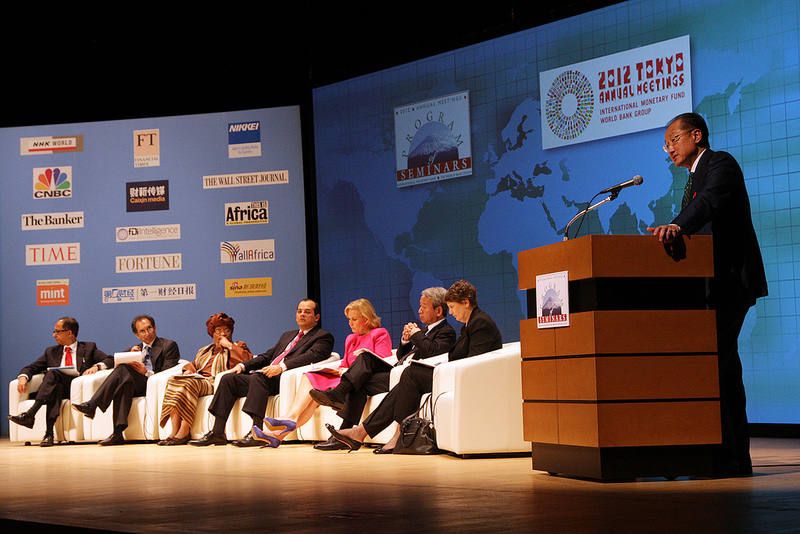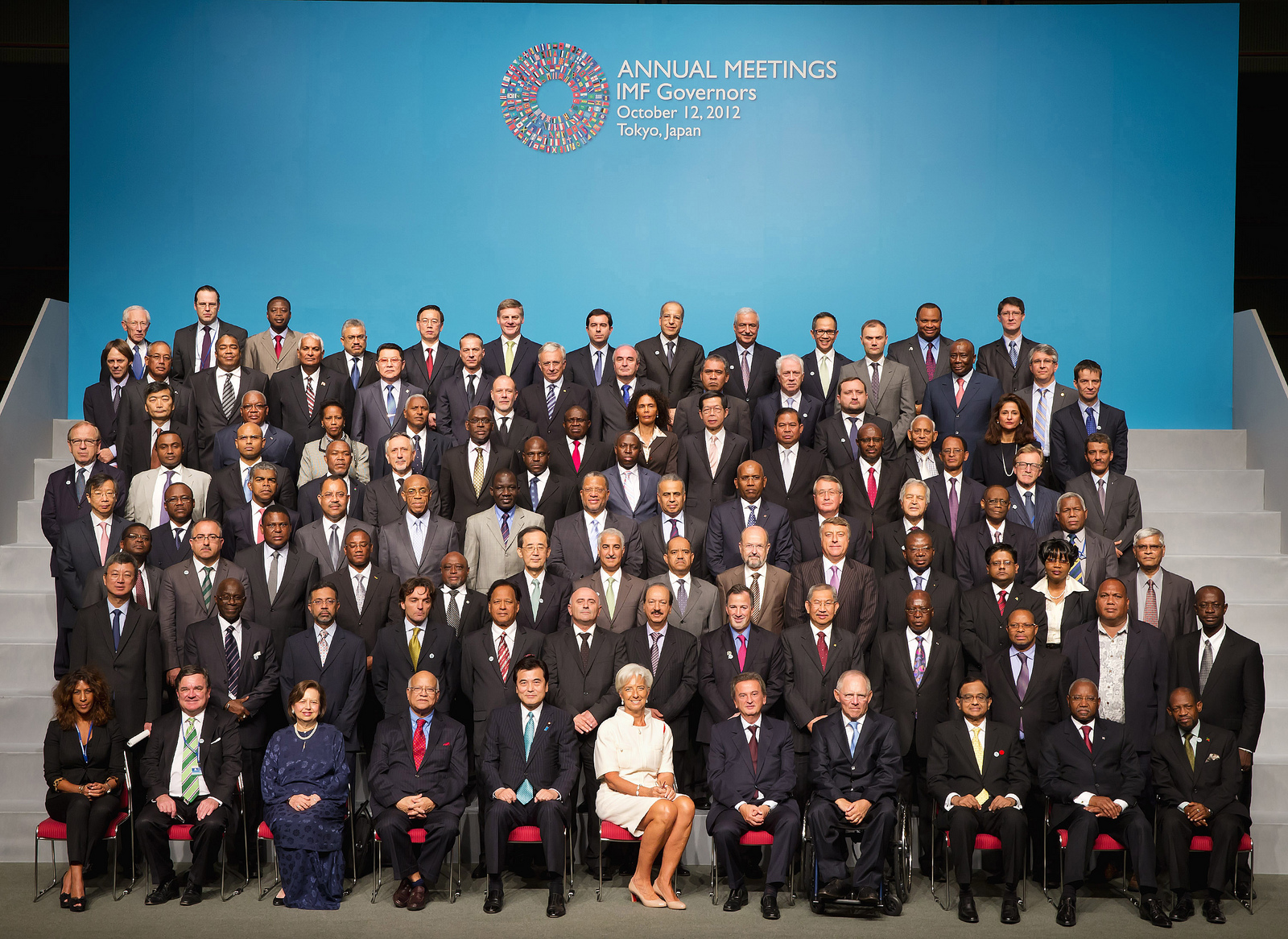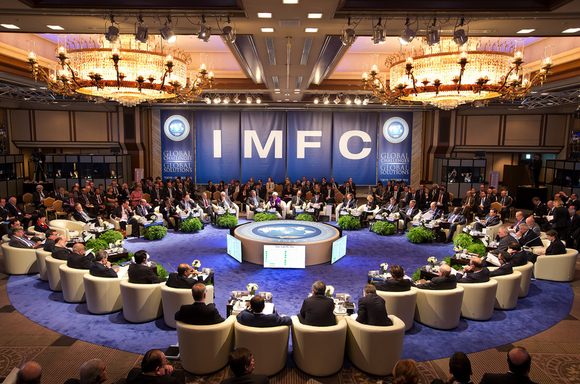In recent years, the World Bank, IMF and the OECD have changed their position on inequality. But to what extent has their recent focus on inequality been directly translated into policy recommendations and measures? And what might the underlying motivations be?
In 2005, the World Bank released its much-discussed World Development Report ‘Equity and Development’. In the report, the World Bank argues for a global focus on equity, indicating a shift from targeting pro-poor growth. Pro-poor growth, also known as ‘shared’ or ‘inclusive growth’, was central to the developmental agenda in the 2000s. The role of growth in poverty reduction, however, remains a topic of controversy. Whereas it is generally accepted that economic growth can help reduce poverty, there is an ongoing debate in how far the trickle-down effect benefits the poor and how sustainable growth can be achieved. During the 1990s, large international organizations like the World Bank and the IMF based their policies on the trickle-down effect as part of the Washington consensus.
By 2005, the World Bank was taking a more critical stance towards the Washington Consensus. In its ‘Economic Growth in the 1990s: Learning from a Decade of Reforms’, the Bank acknowledges that ‘there is no universal set of rules’ that leads to sustainable growth, stating: ‘Growth is difficult to predict because it implies social transformation: a break with past trends, behaviors, and institutions that reflect deep forces in societies and how they organize themselves.’1 But the extent to which the World Bank has actually adopted a new framework, is disputable. Although it claims to focus on equity, it adds that this does not imply a fundamental change of policy principles. As the Bank argues in the conclusion to Economic Growth in the 1990s: ‘We do not propose, however, yet another new framework for development. Instead, recognizing the importance of equity (that is, equality of opportunity and the avoidance of absolute deprivation) implies the need to integrate and extend existing approaches.’2

In an explicit reference to the Washington Consensus it states that, whereas markets are essential for development, the role of the state should not be neglected: “Although the […] ’Washington Consensus’ is sometimes interpreted as anti-state, this is not the main message that survives after more measured consideration. Instead […] events in the 1990s […] showed that good governments are essential for well-functioning markets.” It is also important to note here that the World Bank focuses on equal opportunities rather than equal outcomes. This reflects the important conceptual distinction between equity and equality. Whereas equity refers to equal opportunities, equality stresses the equality of final outcomes. IDO research fellow Harry Jones argues that equity relates to fairness with a focus on processes, whereas equality compares the distribution of specific goods or outcomes among particular individuals or groups (p. 9).
More specifically, Jones emphasizes that “inequality in economic outcomes such as income and wealth is […] crucial to understanding equity, and we should not abandon these as indicators of inequity.”3 Similarly, UNRISD has argued in its ‘Inequalities and the Post-2015 Development Agenda: A Concept Note’ that the World Bank’s focus on investing in human capital has avoided the question of structural factors that might hinder equal outcomes4. Lastly, it is important to note that the World Bank itself does not define equity as a political matter. As LSE economist Robert Wade shows, it was a struggle to get the topic approved by the governing board of the World Bank.5 The executive directors, who represent member governments, argued that “inequality was inherently a political subject that the bank, as an apolitical organization, should not be talking about”. The board could live with the report’s focus on equity, i.e. more equal opportunities to earn an income, because it was apolitical.

As far as the IMF is concerned, a similar transition in the discourse on equality seems to be emerging in some ranks. Notably, Andrew Berg and Jonathan Ostry, from the IMF’s Research Department, persistently reiterate the importance of sustainable growth.6 At the same time, they define the term efficiency as “more sustainable long-run growth”7, implying that sustainable growth is efficient. In effect, Berg and Ostry claim that inequality and unsustainable growth are two sides of the same coin. However, the policy implications of their findings are less clear. As they stress, poorly designed efforts to reduce inequality may even be counterproductive. But they also identify a number of ‘win-win policies, such as better-targeted subsidies, better access to education for the poor that improves equality of economic opportunity, and active labour market measures that promote employment’.
In the backdrop to the current euro-crisis, and the IMF’s increasing call to restructure Greece’s debts, sustainable growth seems indeed to have become a more political issue for the Fund. Oxfam’s top researcher Duncan Green even wrote a blog about the IMF’s ‘socialist’ aspirations, referring to a speech in 2011 by former managing director Dominique Strauss Kahn stating that “inequality goes against notions of fairness and solidarity, but it also threatens economic and social stability.”8 However, as Green adds with a wink of the eye, perhaps DSK had other ambitions in the back of his mind, like becoming France’s new president. In the light of this, it might interesting to note that current IMF director Christine Lagarde may be aspiring to succeed José Manuel Barosso as president of the European Commission9. In that case, she will need the blessing of Angela Merkel, who is certainly not the first to welcome debt restructuring.

Finally, we can also observe a shift in discourse in the policy recommendations of the OECD. In the conclusions to its 2008 report ‘Growing Unequal? Income Distribution and Poverty and OECD Countries’, the OECD said that it “leaves many questions unanswered. It does not consider whether more inequality is inevitable in the future. It does not answer questions on the relative importance of various causes of the rise in inequality. It does not even answer in any detail the question as to what developed countries should do to tackle inequality.”10 The report did little more than draw the general conclusion that good government policy can make a difference. However, the OECD’s 2011 report ‘Divided We Stand: Why Inequality Keeps Rising’ urges more strongly to move from words to action.11 The OECD wants us to believe that inequality trends can be explained in large part by changes in two factors: education and technology. Equity would get a boost, goes the technocrats’ policy logic, if efforts in these realms could be ramped up, and individuals enabled to catch the globalizing tides that are supposed to raise all boats. Unfortunately for the OECD and others, recent studies punch big holes in these beliefs. The OECD’s assertion that rising levels of education and skill substantially reduce inequality is not strongly supported by the facts. Using data covering 146 countries over a sixty year period to 2010, two University of Valencia economists (1) conclude that major changes in ‘human capital inequality’, such as indicated by literacy rates, fail to correlate with changes in income distribution. In another study, focused on the relationship between (increasing) wage inequality and (increasing) levels of education in 13 OECD countries over the period 1985-2005, three researchers associated with the GINI Workshop [ www.gini-research.org ] at the Amsterdam Institute for Advanced Labour Studies (2) conclude that “the increase in wage inequality in the countries considered can only partially be accounted for by observable characteristics such as education and educational premia; i.e., it is largely residual in its nature.” Similarly, the OECD’s hypothesis that technological change is largely to blame for rising inequality does not stand up to close scrutiny. Two economists at the Center for Economic and Policy Research (3) find that “the OECD misses most of the story of inequality because its primary focus is the ratio of the annual wage of the 90th percentile worker to the 10th percentile worker, while most of the benefits of rising inequality were concentrated much further up the income ladder.” They conclude: “In contrast to the OECD, this paper finds that the impact of technology is negligible and actually trivially negative over the period examined.” It’s probably a good thing that the World Bank, IMF and OECD are finally paying attention to inequality. But huge opportunities will be missed if those institutions remain in denial about power, fixated on apolitical matters and ‘residuals’. Let’s get real, and help these institutions get real. They could start by taking more cues from heterodox researchers and policy activists and help chart the upstream sources of inequality. One of these upstream drivers, as Rosnick and Baker suggest, is the financial sector and those collaborating with it. 1. Amparo Castelló-Climent and Rafael Doménech 2012, Human Capital and Income Inequality: Some Facts and Some Puzzles, http://iei.uv.es/docs/wp_internos/RePEc/pdf/iei_1201.pdfOECD: Technocratic Fixes
2. Camilla Mastromarco, Vito Peragine and Laura Serlenga 2011, Return to Education and Income Inequality in Europe and the US, GINI DISCUSSION PAPER 69, December
http://www.uva-aias.net/uploaded_…69-Mastromarco,Peragine,Serlenga.pdf
3. David Rosnick and Dean Baker 2012, Missing the Story: The OECD’s Analysis of Inequality, http://www.cepr.net/index.php/pub…ory-the-oecds-analysis-of-inequality
In contrast to its predecessor, this report both identifies the main causes of rising inequality within OECD countries (with a special focus on emerging economies 12 and provides an extensive range of policy recommendations, emphasizing the role of investment in human capital, inclusive employment promotion and well-designed tax/transfer redistribution policies. But, perhaps most importantly, the 2011 report goes a step further than the 2008 version when it comes to government policy responsibilities, stressing that “greater inequality is not inevitable” and that “governments can and should act”, especially regarding the rise of inequalities in the backdrop to the current crisis. As Secretary General Angel Gurría remarked in his speech during the presentation of the report: “The benefits of economic growth DO NOT trickle down automatically. Greater inequality DOES NOT foster social mobility.” 13 The Caps Lock, by the way, was his. Let’s see if governments keep it on while typing new policy reforms.
Footnotes
- World Bank (2004) Economic Growth in the 1990s – Learning from a Decade of Reforms. p. 12.
- World Bank (2006) World Development Report 2006. p. 226.
- Jones, H. (November 2009) Equity in development – Why is it important and how to achieve it? ODI, working paper 311, p. 9, 17.
- UNRISD (2012) Inequalities and the Post-2015 Development Agenda: – A Concept Note.
- Wade, R. (September 2011) Income Inequality: Should we worry about global trends? From: The European Journal of Development Research, Special Debate Section: The Politics of Poverty and Inequality. Vol. 23, No. 4.
- Berg, A. & J. Ostry (April 2008) Income Inequality and Unsustainable Growth: Two Sides of the Same Coin? IMF Staff Discussion Note (SDN), No. 11/2008, p. 3.
- Berg, A. & J. Ostry (September 2011) Equality and Efficiency. From: Finance and Development, Vol 48, No. 3.
- Green, D. (2010) Is the IMF getting serious about inequality? Looks like it.
- De Gruyter, C. (October 6th, 2012) Eindspel om Griekenland. From: NRC Handelsblad, p. 15.
- OECD (2008) Growing Unequal: Income distribution and Poverty in OECD Countries. Summary in English, p. 7.
- OEDC (2011) Divided We Stand: Why Inequality keeps rising. 4-pager, p. 4.
- OECD (2008) Growing Unequal: Income distribution and Poverty in OECD Countries. Special Focus: Inequality in Emerging Economies (EEs).
- OECD, Gurría, A. (2011).
